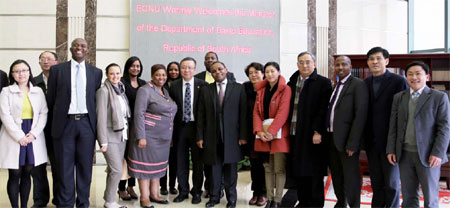Watering trees of knowledge
|
South African Basic Education Minister Angie Motshekga (sixth from left) led a delegation visiting East China Normal University in Shanghai. Provided to China Daily |
East China Normal University takes the lead in fostering academic exchanges with Africa
East China Normal University in Shanghai plans more academic exchanges and cooperation with African higher education institutes, a top university official says.
The university's renewed focus coincides with the visit of South African Basic Education Minister Angie Motshekga and a top-level delegation to Shanghai recently. The delegation visited Shanghai at the behest of the Ministry of Education to study the educational practices of Chinese academic institutions.
The delegation visited East China Normal University and its affiliated primary school and a high school, and the city's education commission and education research department.
Motshekga says that what impressed her most during the visit were the direct links between research, theory and practice among the university and its affiliated schools. The close ties between schools and the university enable the schools to receive advanced research results from the university, and facilitates better education. Such alliances help the university collate information and feedback quickly.
"Lessons learnt from the schools and the experiences gauged are handy for policy formulation," Motshekga says.
"There is now an increased appetite for education globally," she says, adding that through education both privileged and underprivileged people can prosper.
Stressing the need for more collaboration between China and South Africa in education, the minister says more needs to be done to promote Chinese education techniques in Africa.
According to Ren Youqun, vice-president of East China Normal University, education helps promote mutual learning.
In an effort to promote education development in Africa and improve exchanges and understanding for educators from China and Africa, the Seminar for Primary and Secondary School Principals in Anglophone African Countries was held at the university in 2011 and 2013, with the support of the Ministry of Commerce and the Shanghai Municipal Commission of Commerce.
Nearly 40 participants from African countries took part in seminars in 2011 and 2013, which included training courses, lectures, field investigations and discussions. Ren says such program have helped increase knowledge about China's education, development and improved professional knowledge.
"China's experience has helped improve the education quality and standards in several African countries. It has also helped improve ties between Ethiopia and China," says Termiz Mangiste Hagos, one of the program participants from Ethiopia.
In 2010, East China Normal University took the lead in bolstering academic exchanges with Africa through its International Master of Education in Educational Policy and Leadership program. The course aims to cultivate education policy decision makers and researchers with solid professional knowledge, critical thinking and analytical skills who can help improve Africa and other developing counties' education development and international cooperation programs.
"I had a fruitful period at the ECNU and gained several interesting experiences and professional knowledge," says Sima Biratu Tollessa from Ethiopia, one of the program participants.
"China has been a fascinating experience, and the people have been friendly and welcoming. However, very little is known about Chinese people and their culture in many parts of Africa like Tanzania. I am learning a lot and hope to be one of the ambassadors of Chinese people and culture in my country, says Kayombo Joel Jonathan, a graduate from Tanzania.
The university has also established partnerships with some African universities in science research, especially in estuarine and coastal research, such as Tanzania's University of Dar es Salaam and the Nelson Mandela African Institution of Science and Technology.
In 2010, the university partnered with Tanzania's University of Dar es Salaam as part of the "20+20 Cooperation Project among China-Africa Universities." In May 2011, the ECNU-UDSM Joint Research Center for Tanzanian Studies was founded under the Institute of African Studies. The center was established to integrate the academic resources of the two universities and provide an academic platform for joint research and cooperation.
Under the plan, young students from Africa will be selected for doctoral programs at the State Key Laboratory of Estuarine and Coastal Research of the ECNU. Teachers from the laboratory will also work as guest lecturers in Tanzania. The laboratory will also help establish a remote sensing laboratory through teacher and talent training. Meanwhile, the university is also working on preparing a 2014 summer seminar in Tanzania's University of Dar es Salaam.
In addition to the exchange and cooperation in education and science, the university will also further strengthen its African studies department.
The university has long been an important institution in the field of African studies, and its Institute of African studies specializing in the research of African historical and cultural studies, African education and costal and estuarine studies.
"Our school has placed great importance on African studies, and recently published a series of research findings and papers. We are also working on compiling the biographies of famous personalities in Africa," Ren says.
wanghongyi@chinadaily.com.cn



















